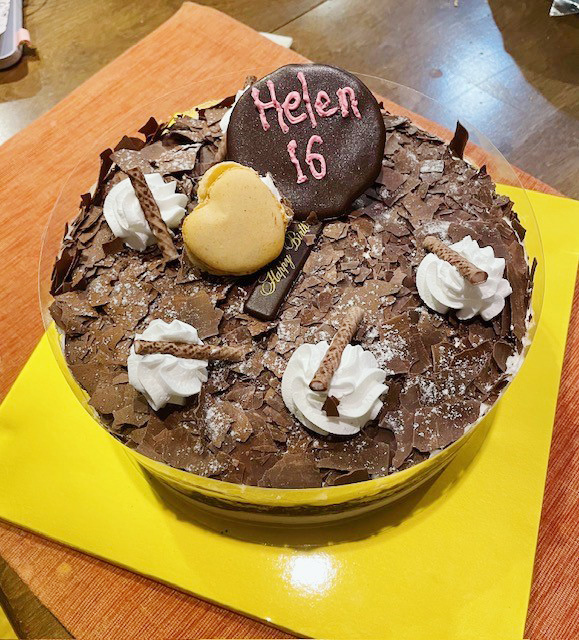by Helen Xia, CHS Student Writer
The title says it all: Is celebrating birthdays becoming less popular?
I was particularly curious about this topic this month because it’s my birthday month! I’m far from alone—did you know that August is the most common birthday month? On the flip side, February is the month with the least births in the United States. If you do the math, you’ll find that nine months back from August lands you around December—a very festive time of the year, indeed.
Ironically, holidays are some of the least common birthdays, including December 25, January 1, October 31, and July 4. Can you guess what the most common birthday is in the United States? It’s an obscure trivia question, so I’ll give you a hint: It’s in September… It’s September 9!
I feel that birthdays become increasingly less relevant as time goes on. When I was younger, I’d receive presents and celebrate with numbered candles. Now, other than having an excuse to eat an entire cake, my birthday is like any other typical day. It’s a little sad, but it’s true. However, is that the case with the general population?
After looking into it a bit, I’ve discovered that how I feel isn’t out of the ordinary. According to YouGov, around 47 percent of Americans feel neutral about their special day, and only 48 percent of people feel happy on their birthdays. Fortunately, 48 percent of people like or love their birthdays, and only 11 percent of people dislike or hate them. Other than happiness, leading sentiments were excitement, indifference, and calmness.
It seems that the attitude toward birthdays is more positive than negative, overall, though there is a very strong group that is simply unconcerned about turning a year older.
Don’t let me deter you from loving birthdays, though! Nine in ten Americans say it’s important to celebrate birthdays, and about 85 perecent of them feel special when their loved ones put a lot of energy into celebrating their day. With that being said, you may be wondering: How exactly do people choose to celebrate their birthdays?
From the same YouGov poll referenced earlier, the organization concluded that the most common American tradition is thanking God for being alive; specifically, 54 percent of the respondents did this nearly every year. Following this is spending time with family, opening presents and cards, and having a special meal or eating cake.
Speaking of cake, can you guess Americans’ least and most favorite birthday cakes? There’s one winner for most favorite, and it’s not a close call: It’s chocolate cake. This is followed by ice cream cake and cheesecake, which is a statistic I didn’t expect. On the other hand, the most disliked cakes are funfetti and carrot cake. I didn’t expect that, either.
There’s still a question I haven’t answered: Why? Why do people like or dislike birthdays? I thought this would be an interesting interview question, so I asked people—both teenagers and adults—to get some insight into this query. What exactly does a birthday stand for to people?
Most of the teenagers I received responses from didn’t feel passionate about their birthdays. “Nothing,” a teenager replied, “usually, it’s just cake.” Similarly, another said, “It’s boring, honestly. I don’t think much about it until it comes up.”
Among the neutral statements were a few saddening ones. “I feel nothing, to be honest,” a teenager commented. “I don’t like celebrating my birthday. It’s just one day closer to death, and it’s [one] day closer to losing the people you love.”
Moving on to the adults: The trend of neutrality continued in the replies from them, as well. “It’s nothing special,” a young adult explained, “It’s just another day.” Another shrugged, “Nothing, I don’t celebrate ‘cause I don’t care. It’s [not] important.”
Thankfully, I did receive some positive remarks this time!
“I feel like birthdays are a happy celebration meant to show appreciation toward the person being celebrated,” an adult elaborated. “Maybe it’s a bit morbid, but [I feel] glad this person was able to live another year with me. I really love celebrating birthdays and keeping notes on things I know people like, so I can get them something related.”
Another answered, “[I] can’t wait [for my birthday.] I like it; it’s exciting! [I] just went out with my friends for a few drinks.”
On that note of birthday tradition, somebody added, “I don’t really celebrate my birthdays, but I chill with my friends.”
The final respondent gave a thoughtful message to everyone: “[Birthdays give] another chance to grow and mature, explore, and learn from mistakes, and you only get so many of those chances in life.”
All of the responses considered, it’s evident that this “special” day isn’t special for everyone, which is understandable. While I struggle sometimes to feel happy about getting a year older, I do think it’s ultimately a day to feel grateful and proud of yourself for making it this far. It wasn’t easy to do so, I’m sure!
In a few weeks, I’ll be seventeen. Regardless of how old I feel, one fact is settling in now: I have a long road ahead of me. I’m almost a legal adult now, which is crazy!
Does anybody have advice on how to handle adulthood? I’m going to need it.
“My birthday cake for my sixteenth birthday! It was a sweet sixteen, indeed.”

Photo by Helen Xia

